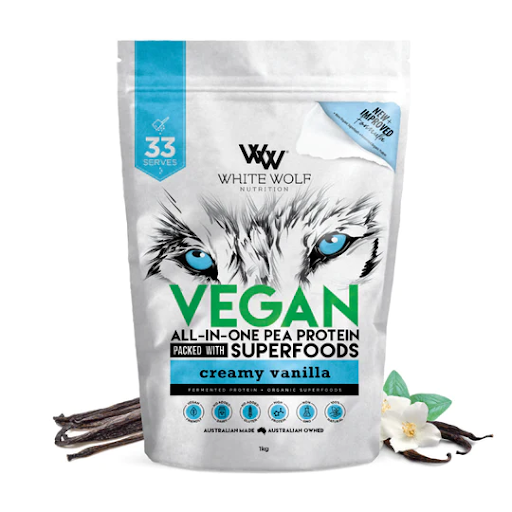There has been a significant rise in the popularity of plant-based diets, with more people embracing the idea of incorporating plant proteins into their meals. One such protein that has gained attention is custard plant protein. Known for its health benefits and versatility, custard plant protein is becoming a staple in Australian diets. In this blog post, we will explore the nutritional benefits of custard plant protein and why it is worth considering as a valuable addition to your diet.
What is Custard Plant Protein?
Custard plant protein is derived from the custard apple, a tropical fruit native to South America, but now widely cultivated in many countries including Australia. The custard apple is not only known for its delicious taste and creamy texture but also for its impressive nutritional profile. It contains essential nutrients such as vitamins, minerals, dietary fibre, and antioxidants, making it a valuable addition to any diet.
Protein Powerhouse
Protein is like the building blocks for our body. It helps fix our muscles and other body parts when they get hurt. Protein also makes stuff called enzymes and hormones that our body needs to work well. It's like the body's little helpers. Plus, protein is like a shield for our immune system, which keeps us healthy. So, eating protein is super important for our body to do all these cool things. Many Australians, especially those following a vegetarian or vegan lifestyle, often struggle to meet their protein requirements. This is where custard plant protein comes in.
Custard plant protein is a rich source of plant-based protein, offering approximately 21.6 grams of protein per serving. This makes it an excellent alternative for individuals looking to increase their protein intake without relying on animal-based sources. Whether you are an athlete, fitness enthusiast, or simply someone looking to maintain a balanced diet, custard plant protein can help meet your protein needs.
Low in Carbs and Fat
In addition to being a protein powerhouse, custard plant protein offers other nutritional benefits. It is low in carbohydrates, with only 5.9 grams per serving, making it suitable for individuals following low-carb or keto diets. Furthermore, custard plant protein is low in fat, with just 3 grams per serving. This makes it an ideal choice for those watching their fat intake while still enjoying a delicious and nutritious treat.
Rich in Fibre
Dietary fibre is an important component of a healthy diet. It aids in digestion, promotes gut health, and helps regulate blood sugar levels. Custard plant protein is a good source of dietary fibre, providing approximately 3 grams per serving. By incorporating custard plant protein into your diet, you can increase your fibre intake and promote overall digestive health.
Packed with Essential Nutrients
Custard apples, the source of custard plant protein, are rich in essential vitamins and minerals. They are particularly high in vitamin C, which plays a vital role in boosting the immune system and promoting collagen production for healthy skin. Additionally, custard apples contain vitamin B6, folate (vitamin B9), magnesium, niacin (vitamin B3), and antioxidants, all of which contribute to overall health and well-being.
Supports Muscle Growth and Recovery
Custard plant protein is rich in essential amino acids, including leucine, isoleucine, and valine, which are crucial for muscle growth and repair. These amino acids help stimulate muscle protein synthesis, making custard plant protein a valuable choice for athletes and individuals involved in regular physical activity. By consuming custard plant protein after a workout or as part of a balanced meal, you can support muscle recovery and promote optimal performance.
Promotes Heart Health
A diet rich in plant-based proteins, such as custard plant protein, has been linked to improved heart health. Studies have shown that plant-based proteins help reduce the risk of cardiovascular diseases, such as heart attacks and strokes. Custard plant protein is cholesterol-free and low in saturated fat, making it a heart-healthy option for those looking to maintain cardiovascular wellness.
Suitable for Those with Dietary Restrictions
Custard plant protein is a versatile option that can accommodate various dietary restrictions and preferences. It doesn't have any gluten in it, so it's safe to eat for people who can't have gluten or have celiac disease. Moreover, custard plant protein is lactose-free and vegan, making it an excellent alternative for those who follow a dairy-free or plant-based lifestyle. It provides a high-quality protein source without the potential allergens or ethical concerns associated with animal-based proteins.
May Aid Weight Management
Keeping your weight in a good, healthy range is important for feeling well and being healthy. Custard plant protein may contribute to weight management due to its satiating effect. Protein is known to increase feelings of fullness and reduce appetite, which can help control calorie intake and prevent overeating. By incorporating custard plant protein into your meals and snacks, you may feel more satisfied and less likely to reach for unhealthy, calorie-dense foods.
Supports Bone Health
While custard plant protein is not a significant source of calcium, it contains other essential nutrients that contribute to overall bone health. Magnesium, for instance, plays a vital role in bone formation and maintenance. Custard plant protein provides a good amount of magnesium, which can complement a well-rounded diet focused on bone health. Pairing custard plant protein with other calcium-rich foods, such as leafy greens or fortified plant-based milk, can further support bone strength and prevent bone-related issues like osteoporosis.
Sustainable Protein Source
In addition to the nutritional benefits, custard plant protein is also an environmentally friendly protein source. Plant-based proteins cause much less harm to the environment in terms of carbon emissions compared to animal-based proteins. By choosing custard plant protein over animal-based alternatives, you can contribute to reducing greenhouse gas emissions, land degradation, and water usage associated with livestock farming.
How to Incorporate Custard Plant Protein into Your Diet
Now that we understand the nutritional benefits of custard plant protein, let's explore some delicious and creative ways to incorporate it into your diet:
Protein Smoothies: Blend custard plant protein powder with your favorite fruits, vegetables, and liquid of choice for a nutritious and protein-packed smoothie.
Plant-Based Custards: Use custard plant protein powder to make creamy and indulgent plant-based custards. You can experiment with different flavors like vanilla, chocolate, or salted caramel.
Protein Bars and Balls: Create homemade protein bars or energy balls using custard plant protein powder as a base. These make for convenient and healthy snacks on-the-go.
Protein Pancakes: Add custard plant protein powder to your pancake batter for a protein boost. Serve with fresh fruit and a drizzle of maple syrup for a delicious breakfast or brunch option.
Conclusion
Custard plant protein has a range of nutritional benefits for our health which is an excellent addition to Australian diets. With its high protein content, low carb and fat content, and abundance of essential nutrients, custard plant protein is a versatile and convenient option for individuals looking to maintain a balanced and plant-based diet. By incorporating custard plant protein into your meals and snacks, you can enjoy the health benefits while indulging in delicious and satisfying treats.












